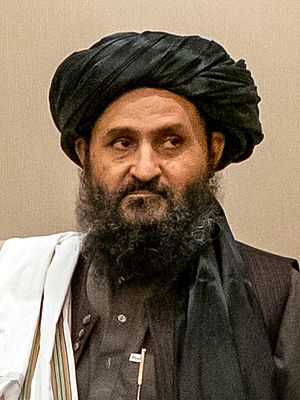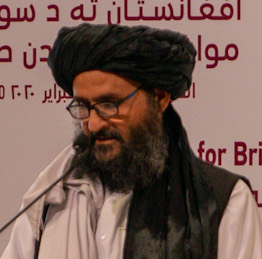Abdul Ghani Baradar facts for kids
Quick facts for kids
Abdul Ghani Baradar
|
|
|---|---|
|
عبدالغنی برادر
|
|

Baradar in 2020
|
|
| Acting First Deputy Prime Minister for Economic Affairs of Afghanistan | |
| Assumed office 7 September 2021 Serving with Abdul Salam Hanafi
|
|
| Supreme Leader | Hibatullah Akhundzada |
| Prime Minister | Hasan Akhund (acting) |
| Preceded by | Hasan Akhund (2001) |
| Third Deputy Leader of Afghanistan | |
| Assumed office 15 August 2021 Serving with Sirajuddin Haqqani
and Mullah Yaqoob |
|
| Emir | Hibatullah Akhundzada |
| In exile 24 January 2019 – 15 August 2021 |
|
| Supreme Leader | Hibatullah Akhundzada |
| Preceded by | New seat |
| Head of the Economic Commission | |
| Assumed office 2022 |
|
| Supreme Leader | Hibatullah Akhundzada |
| Head of the Political Office of the Islamic Emirate of Afghanistan | |
| In exile 24 January 2019 – 17 August 2021 |
|
| Supreme Leader | Hibatullah Akhundzada |
| Preceded by | Sher Mohammad Abbas Stanikzai |
| Succeeded by | Suhail Shaheen |
| First Deputy Leader of the Islamic Emirate of Afghanistan | |
| In exile May 2002 – 8 February 2010 |
|
| Supreme Leader | Mullah Omar |
| Preceded by | Mohammad Rabbani |
| Succeeded by | Akhtar Mansour |
| Deputy Minister of Defense of the Islamic Emirate of Afghanistan | |
| In office 27 September 1996 – 15 April 1997 |
|
| Prime Minister | Mohammad Rabbani |
| Supreme Leader | Mullah Omar |
| Personal details | |
| Born | 29 September 1963 Yatimak, Uruzgan, Afghanistan |
| Children | Mullah Yaqoob (Disagreement) |
| Occupation | Politician, Taliban member |
| Awards | 100 Most Influential People in 2021 by Time magazine |
| Political affiliation | Taliban |
| Military service | |
| Allegiance | Afghanistan |
| Branch/service | Armed Forces of the Islamic Emirate of Afghanistan (1996–2001) |
| Rank | Corps Commander Deputy Chief of Staff Chief of Staff |
| Commands | Western Afghanistan Corps Central Corps, Kabul |
| Battles/wars | Soviet–Afghan War Afghan Civil War (1996–2001) War in Afghanistan (2001–2021) |
Abdul Ghani Baradar (born on September 29, 1963) is an Afghan politician and religious leader. He is currently the acting First Deputy Prime Minister for Economic Affairs in the government of Afghanistan. He is a co-founder of the Taliban group, which he started with Mullah Omar. From 2002 to 2010, he was Omar's main deputy. Since 2019, he has been one of the top leaders of the Taliban.
He held important roles when the Taliban first ruled Afghanistan from 1996 to 2001. After the Taliban government was removed in 2001, he became a key leader of the group from Pakistan. He was arrested in Pakistan in 2010 but was released in 2018. The United States asked for his release because they believed he could help with peace talks. After his release, he became a deputy leader of the Taliban and led their political office in Qatar. When the Taliban took control of Kabul in August 2021, he returned to Afghanistan and took on his current government position.
Baradar is seen by some as a more moderate member of the Taliban. In February 2020, he signed an agreement with U.S. President Donald Trump. This agreement led to the withdrawal of United States troops from Afghanistan. In September 2021, Time magazine named him one of the "100 Most Influential People In 2021" for his part in the Taliban's return to power.
Contents
Early Life and Background
Abdul Ghani Baradar was born around 1963 in a village called Yatimak in the Uruzgan Province of Afghanistan. He belongs to the Zirak Durrani Pashtun group, which is a tribe in Afghanistan.
When he was a teenager, he became friends with Mullah Omar, who would later become the first leader of the Taliban. Omar gave him the nickname 'Baradar', which means 'brother' in Pashto, because of their close friendship.
Political Career
Fighting in the Soviet War
In the 1980s, Baradar fought in the Soviet–Afghan War. This was a war where Afghan fighters, called Afghan mujahideen, fought against the Soviet-backed Afghan government. Baradar served as Mullah Omar's deputy in a group of these fighters.
Early Roles in the Taliban
In 1994, Baradar was one of four men, including Mullah Omar, who founded the Taliban in southern Afghanistan. When the Taliban ruled Afghanistan from 1996 to 2001, Baradar held several important jobs. He was reported to be a governor of provinces like Herat and Nimruz. He also served as a military commander for western Afghanistan. He was also listed as a Deputy Minister of Defense.
Role in the War in Afghanistan
After the September 11, 2001, attacks, the United States invaded Afghanistan and removed the Taliban from power. Baradar fought against the U.S.-supported forces. He later became a key leader of the Taliban, directing their efforts from Pakistan. He was known for being open to talking with the Afghan government about peace.
Baradar was involved in several attempts to start peace talks, including in 2004 and 2009. Many people saw him as someone who could play an important role in reaching a peace agreement.
Time in Prison in Pakistan
In early 2010, Baradar was arrested by Pakistan's intelligence agency in Karachi. Some reports suggested that he was arrested because he was secretly discussing a peace deal with the Afghan government without Pakistan's involvement. The Afghan government was reportedly upset by his arrest because they were holding secret talks with him.
After many years, Pakistan released Baradar in October 2018. The United States had asked for his release, believing he could help with the peace process in Afghanistan.
Leadership After Release
In January 2019, about three months after his release, Baradar was appointed a deputy to the supreme leader of the Taliban. He also became the head of the Taliban's political office in Doha, Qatar. He was the most senior of the three deputies to the leader.
In February 2020, Baradar signed the Doha Agreement. This agreement was about the withdrawal of U.S. forces from Afghanistan.
On August 17, 2021, Baradar returned to Afghanistan for the first time since 2001. There were rumors that he might become the president of Afghanistan after the Taliban took control of Kabul in August 2021. On August 23, 2021, the Director of the CIA, William J. Burns, met secretly with Baradar in Kabul. They discussed the deadline for the U.S. military to leave Afghanistan.
In September 2021, there were rumors that Baradar had been injured or killed. However, a video interview with him was released the next day, where he denied these rumors.
See also
 In Spanish: Abdul Ghani Baradar para niños
In Spanish: Abdul Ghani Baradar para niños
 | Bayard Rustin |
 | Jeannette Carter |
 | Jeremiah A. Brown |


